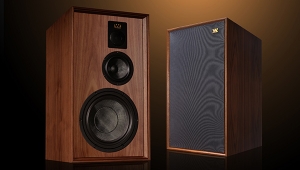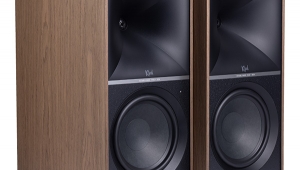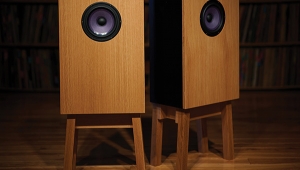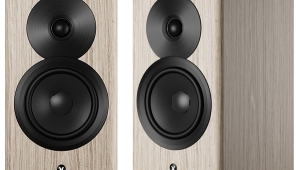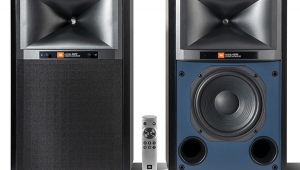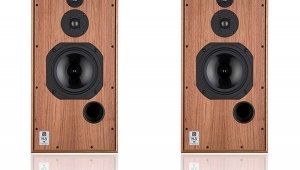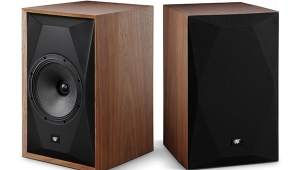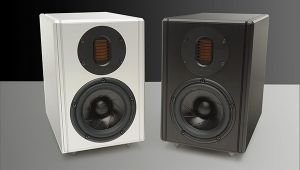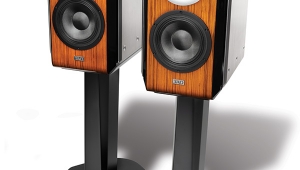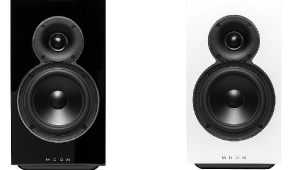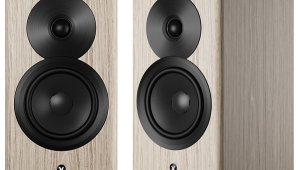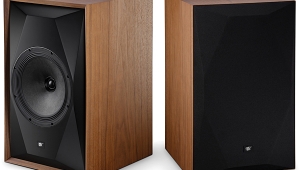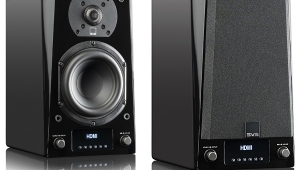| Columns Retired Columns & Blogs |
Usher Audio Technology Be-718 loudspeaker Page 2
First Kate begins to sing, then Pat Donaldson's Fender bass peals down low, then Kate's piano begins, followed by multiply tracked harmony vocals by both sisters, which are pierced by Andrew Cowan's screaming lead guitar, which is reinforced by Anna's accordion—and that's not even including Chaim Tannenbaum's bar-walking tenor-sax solo. Far from being the quiet acoustic gem I remembered, "Midnight Flight" is an immense, sprawling studio masterpiece, and the Be-718s simply floored me by keeping up with it every step of the way.
I resolved to heed my own advice about assumptions. No more recordings designed to play to "small speaker strengths."
I wanted to wallow in a little beauty, so I grabbed Rahsaan Roland Kirk's Blacknuss (CD, Rhino R2 71408) and cued "Ain't No Sunshine." Holy crap! Again, I was struck by the power of the recording, the effortlessness of the sound, and the impact of the bass, but even more by the almost physical heft of Kirk's vocalized flute. My gosh, I thought, I'd forgotten what a big man he was. Wait a minute! Did I just think about the size of a man because of how a few drivers in a box moved some air?
Yes, I did. And they got it right.
Recollecting the last time I saw Kirk perform, I wandered over to my jazz shelves and noticed Bright Moments (CD, Rhino R2 71409), a two-disc recording of a 1973 set of shows at the Keystone Korner. Hmmm, I thought. I'm not sure I've listened to this since Rhino reissued it in 1993. Wonder if it's good?
Jethro H. Tull! Bright Moments is a shambolic, monolithic masterpiece. Every Kirk performance had its transcendent moments, but every moment at the Keystone was outstanding. "Something special happens whenever we play there," Kirk told Joel Dorn, who produced the recording. Dorn, who also produced Swiss Movement, by Les McCann and Eddie Harris, had a special fondness for Bright Moments. "It's better than good—there's a certain something on the record that is in the air, on the floors, on the walls of the club. You can't see it, you can't taste it, you can't touch it, but you can sure as hell feel it through Rahsaan's music."
Through the Be-718s, could I ever. Powerhouse drummer Robert Shy was more powerful than a locomotive, and Henry Pearson's bass was supple and huge. Most of all, Kirk was as big as life. Perhaps the magical song of the set was his interpretation of Fats Waller's enchanting "Jitterbug Waltz" on stritch, where he plumbs the instrument's lowest octaves before launching into cascades of improvisation at the top of its register. Whether down low in Pearson's deep, deep accompaniment, or re-creating Kirk's flights of fancy, the Ushers kept it real.
And Dorn was right—you do feel something in Kirk's music: you hear how much he loved it. I'm not sure John Atkinson has a measurement for that, but the Ushers reproduced it palpably, holographically, and definitively.
Tord Gustavsen's "Turning Point," from Changing Places (CD, ECM 1834), is a suspended cathedral of a work—it's all about space and air, and it moves forward like a puzzle unfolding. The Be-718s gave bassist Harald Johnsen impressive slam, if perhaps not quite all he deserved. Few stand-mounted two-ways can come as close as the Ushers, however. Gustavsen's liquid piano sounded fully present, and the Swiss-watch precision of Jarle Vespestad's drumming was extraordinarily vivid. If you're a fiend for high-frequency detail but are averse to etch, grain, or oil-can resonances, the Be-718 has your number. Its tweeter never upstages the music, but self-effacingly delivers the goods.
Storm of difference
As my audition of the Be-718s continued—I was having too much fun to rush it—I realized that the Ushers reminded me most of the Dynaudio Confidence C1 ($7000/pair), which I reviewed in the November 2007 Stereophile (Vol.30 No.11). Like the Usher, the Dynaudio has uncommonly deep bass for a smallish two-way design. The two were also similar in needing to be bossed around by a powerful amp, the Ushers seeming to need a touch more Welly.
The sonic resemblance was remarkable. The Confidence C1 really is remarkable—but at half its price, the Be-718 came eerily close. I began by listening to Leif Segerstam and the Helsinki Philharmonic's recording of Einojuhani Rautavaara's Symphony 7, Angel of Light (CD, Ondine ODE 869-2), and was hard-pressed to determine a preference. The C1 delivered more bottom-end extension—or, at least, more easily heard detail—but also had an ever-so-slightly more forward top end. The Be-718 had an admirably relaxed top end while surrendering not one whit of detail.
Kirk's Bright Moments was dynamically impressive through both speakers, though I believed I heard a bit more of the Keystone Korner's acoustic through the Dynaudios, specifically the flex of the stage's floor under Robert Shy's trapset. Just a smidge more, however.
Both speakers did a magnificent job of conjuring the thunderous power of the full-tilt-boogie onslaught of Kirk's Vibration Society, however.
On the other hand, Kirk's stritch sounded less aggressive through the Usher—not, I hasten to add, less alive, simply less strident. With Kirk's tenor saxophone, however, I noticed a bit of hardness in the Be-718's portrayal of the upper midrange—possibly a slight wrinkle in the crossover's handoff to the tweeter at 2kHz?
"Beneath Still Waters," from Emmylou Harris's Blue Kentucky Girl (CD, Reprise 3318), was perhaps the singer's purest foray into country music prior to her spectacular acoustic triumph Roses in the Snow. When Harris sings "But each and every heart / Must take its turn at misery," her voice soars straight into Patsy Cline territory. But the next lines—"And this time it's me / And I'll cry alone"—are delivered with such purity that they meet Pound's definition of poetry: It is news that stays news.
In my review of the Confidence C1s, I remarked that they had an ability to deliver female vocals that was nothing short of magic. I still think so—Harris broke my heart again. As she did through the Usher Be-718s. Was one speaker better than the other with women's voices? They were close, but I'd give the slight edge to the Confidence C1s, again noting that Harris's transition from chest to head tones seemed smoother and rounder. The Be-718s were just a shade less liquid. I wouldn't bet my paycheck on the difference between them. Both were scary good.
And remember, the Ushers are half the price.
So big
They say that committees are a great way to prevent things from getting done, but the men who designed the Usher Be-718 have achieved something remarkable: a small speaker that sounds big, and possibly twice as good as it has a right to. And they made it good-looking as well.
If you can't live without bottom-end extension below 30Hz, if you listen to death metal in a warehouse cranked up to 11, well, the Usher Be-718 isn't for you. Look elsewhere.
But if you don't want to spend a penny more than you have to for not simply good but great sound, if you love music and want to keep the affair alive, you should listen to the Usher Be-718—and buy a powerful amplifier with the money you'll save.
You won't regret either decision.
- Log in or register to post comments
